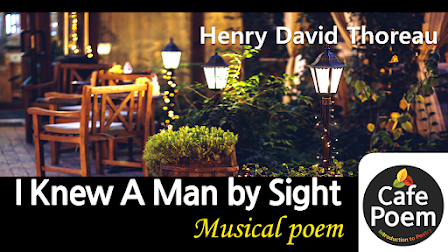I Knew A Man By Sight
I knew a man by sight,
A blameless wight,
Who, for a year or more,
Had daily passed my door,
Yet converse none had had with him.
I met him in a lane,
Him and his cane,
About three miles from home,
Where I had chanced to roam,
And volumes stared at him, and he at me.
In a more distant place
I glimpsed his face,
And bowed instinctively;
Starting he bowed to me,
Bowed simultaneously, and passed along.
Next, in a foreign land
I grasped his hand,
And had a social chat,
About this thing and that,
As I had known him well a thousand years.
Late in a wilderness
I shared his mess,
For he had hardships seen,
And I a wanderer been;
He was my bosom friend, and I was his.
And as, methinks, shall all,
Both great and small,
That ever lived on earth,
Early or late their birth,
Stranger and foe, one day each other know.
Enjoy the poem with beautiful music.
poem video👇
Who wrote the poem "I Knew A Man by Sight"?
Henry David Thoreau (July 12, 1817 – May 6, 1862)
Henry David Thoreau was an American poet, essayist, naturalist, and philosopher. He was a leading transcendentalist and is best known for this book “Walden,” a personal reflection upon simple living in nature. His writings display a unique combination of a poetic sensibility, philosophical austerity, and attention to practical detail. Thoreau was a lifelong abolitionist, and he pioneered modern-day environmentalism. His political philosophy of civil disobedience, which argued for disobedience to an unjust state, later greatly influenced such historical figures as Leo Tolstoy, Mahatma Gandhi, and Martin Luther King Jr. He died of tuberculosis at 44.
"I Knew A Man by Sight" explanation
The poem is about how two strangers meet
and become friends. The speaker then goes on to say that everyone is connected
to each other and there are no strangers in this world. No matter how others
appear (great or small/ stranger and foe), we are all connected to each other
as long as we belong to the same universe and can build a deeper relationship.








